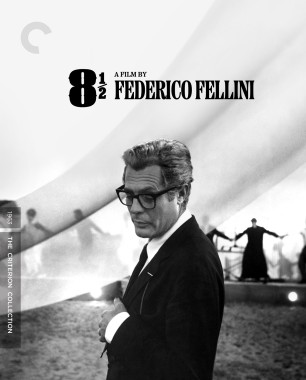
Allan Arkush’s Top10
Allan Arkush is an Emmy-winning television director and executive producer of NBC’s hit series Heroes. Arkush's directing credits also include the Ramones’ cult classic Rock ’n’ Roll High School, which Rolling Stone magazine named as one of the top-10 rock n' roll DVDs of all time.
-
1 (tie)
-
Jean-Luc Godard
Breathless
It was 1966, my senior year of high school, and with one of my closest friends in tow I cut school and went into New York, to the Bleecker Street Cinema, to see a double bill of Breathless and 8 1/2. I had seen foreign films before, but nothing like these two. We loved Breathless. It was rebellious, anarchic, romantic, and the characters were so superkool we wanted them in our seventeen-year-old lives. But as much as Breathless moved and influenced me, 8 1/2 rocked my world. In the first five minutes, during Guido’s dream, I could feel my brain collapsing in on itself. The camera’s POV of Guido’s foot tethered to the ground as he floats high above the ocean, then suddenly falling only to awake with a hand grasping for consciousness, was deeply personal for me. I often wake from my nightmares in much the same way. Forty years later, in season one of Heroes, an episode called “6 Months Ago” afforded me the opportunity to re-create those very same shots. It was thrilling to use those same images in the service of a different story of my own creation. If forced to name my all-time favorite movie sequence, the childhood memory of “Asa Nisi Masa” would make the final four. It is cinema as magic. The way the mentalist grapples with the words Asa Nisi Masa, and we travel through Marcello Mastroianni’s mind and into a haunting memory of the past. His childhood is alive with mysticism, mischief, and a lost family’s love. Don’t get me started about the exquisite finale, with its parade of characters and clowns. Is Guido dead or not? I still haven’t decided. Leaving the Bleecker, my mind permanently blown, I thought that I would never understand this movie—and that is one of its strengths. After forty-two years and as many viewings, it reminds me of the best of Bob Dylan, the last line of “Frankie Lee & Judas Priest”: “Nothing is revealed.”
-
2
Lindsay Anderson
If....
I was at NYU film school when I first saw If…. The second time was the very next day, when I brought friends and classmates to share this extraordinary movie experience. I have always harbored fantasies of blowing up my high school, but until If…. I never realized that I was not the only one. Obviously If…. was a huge influence on Rock ’n’ Roll High School. In the mid-1980s, I wrote an article about high school movies for American Film magazine in which I opined that If…. was the greatest of them all. A month later, I received a lovely letter from Lindsay Anderson, my hero (I also love O Lucky Man!). We corresponded for several years, finally meeting at the Telluride Film Festival. He called me “a movie brat typical of my generation” for preferring The Searchers to She Wore a Yellow Ribbon. (I treasure his criticism.) Wrapped in a scarf, Malcolm McDowell is as riveting and charismatic as ever in his screen debut. I showed the movie to my teenage daughters, who only know Malcolm as Linderman on Heroes, and it impressed a whole new generation of rebellious teens. If….’s DVD extras, especially “O Lucky Malcolm,” really capture the spirit of the man and the movie.
-
3
John Ford
Young Mr. Lincoln
Since my daughters were old enough to enjoy movies, I have been giving them an ongoing Film Appreciation course. The successes—Bringing Up Baby, Rio Bravo, Holiday, On the Waterfront, Rebel Without a Cause—outweigh the failures of Dr. Strangelove, Citizen Kane (“Yeah, Dad, it’s supposed to be great, but I didn’t like him at all. Kane deserved to die alone”). When my youngest was eight years old, she was learning about the Civil War. So one night we watched Young Mr. Lincoln. I prepped for the screening by watching all the extras and commentaries. After giving her the proper historical and cinematic introduction, we watched the movie. It was even better and more original than I remembered it. Jackie’s response put her at the head of my class. “It was really good, funny too. But at the end, when Abe Lincoln rides away, he says he’s just riding up the hill. I don’t think he is. It looked to me like he was riding into history.” I couldn’t have been prouder!
-
4
Jean Renoir
The Rules of the Game
A perfect movie. Too perfect for me the first time I saw it at the Museum of Modern Art in 1971. It went right by me. The same thing happened the first time I had dinner at Chez Panisse. Sometimes an aesthetic experience is so sure-handed and flawless it’s beyond your ability to absorb it. I returned to Rules of the Game after seeing Grand Illusion and my favorite Renoir, The Crime of M. Lange. In fact, I saw a whole retrospective of his work before I realized what I had missed the first time I saw Rules of the Game. “Everyone has his reasons” is more than a line of dialogue; it is a comment on the true nature of what makes us so painfully human. Twenty-five years of meals and a day in the kitchen of Chez Panisse has taught me how they make a masterpiece right.
-
5
Yasujiro Ozu
Tokyo Story
Reality check. The last time I saw it was with my wife and several friends. We are all about the same age, have elderly parents, or have lost our parents in the last couple of years. After the movie, we talked about our parents and how we had treated them. Everyone felt guilty for days. I studied the disc of documentaries, and treasure the Ozu films in my collection. “Real life intrudes just when you’re making other plans.”
-
6
Preston Sturges
The Lady Eve
I feel about The Lady Eve the same way I feel about A Hard Day’s Night. Both movies are on my all-time top ten list of favorites. The first time I saw them, I had the same impression of comic density. Enormous energy that I was running to keep up with. I felt like I had to see this movie again, if only to have another shot at laughing at the hundreds of jokes. I love movies that make you feel like you are not getting it all the first time, that there is much more to be had. Eve is my favorite Sturges. I love the chemistry between Barbara Stanwyck and Henry Fonda—like when she takes him back to her stateroom, manipulates him into making a pass, and shuts him down with “Hopsie, you ought to be kept in a cage.” On a pure filmmaking level, the honeymoon night on the train when Eve confesses to all her premarital dalliances is a tour de force of writing, acting, and editing, and it’s one of the best musically scored comic sequences in any movie ever! Sturges’s mother was an adventuress, a confidante, and traveling companion of Isadora Duncan. I like to think there is more than a little of his mother in Eve.
-
7
Akira Kurosawa
Seven Samurai
My father was a film buff. He instilled in me an appreciation of the art of movies. He felt that there was no cinema artist greater than Kurosawa. At a very young age he took me to see Throne of Blood and Seven Samurai. Since then I’ve seen Seven Samurai over fifty times, in theaters, on VHS, laserdisc, and DVD. The latest Criterion edition is my favorite version of my favorite action movie. I love all the extras, especially the history of the samurai, which really enhances the movie’s historical context. In the second season of Heroes, we did a story line set in seventeenth-century Japan. The Seven Samurai box set was an invaluable resource for the costume and art department. About half of our crew watched it and were really inspired by what they saw. It’s one of those movies that I can’t turn off. One minute of viewing and I’m hooked. I’ve heard many people say that about the first two Godfather films, but for me Seven Samurai is the one that lures me into watching multiple hours of a movie I know by heart.
-
8
Douglas Sirk
Written on the Wind
I’ve been directing television for almost twenty-five years. In that time, one thing that I have learned for sure is that Douglas Sirk is the godfather of all dramatic television. It all comes from him. The best of television is redolent with his sense of ironic and knowing melodrama. He piles on the conflict in each and every scene. Bad things and disappointment stalk his characters, but always with style. The first ten minutes of Written on the Wind are literally drunk with this style. Robert Stack drinking from the bottle in an intensely yellow sports car, hundreds of leaves that blow through a Texas mansion, pages of a calendar that flip through time, and, above all else, Dorothy Malone. Nobody mambos like Malone: the sequence where she drunkenly mambos in her room while her father dies of a heart attack is choreographed for the camera like a Minnelli musical. Sirk blocks a scene with such dynamism and artfulness you can turn off the sound and know exactly what’s going on. All That Heaven Allows got me into Sirk, but Written on the Wind is the poster on my office wall—it’s a touchstone, a timeless piece of popular art.
-
9
D. A. Pennebaker
Monterey Pop
Anyone who knows me is aware that I am obsessed with rock and roll. I have thousands and thousands of LPs, CDs, and shelves of DVDs. Monterey Pop is one of the DVDs that I play the most, especially the disc featuring Jimi Hendrix and Otis Redding. Hendrix is a guitar colossus so relaxed during his first American concert that he’s chewing gum. I love his groovy raps, the intro to “Like a Rolling Stone.” One of my all-time favorites, Otis Redding, with Booker T. and the MG’s, plays a ferocious and ultratight set that to me says that this is one of the greatest groups of all time, at their absolute peak. Months on the road hone “Shake” and “I’ve Been Loving You Too Long” into a pair of definitive performances. The box set allows us to witness the beginning of the era of great live rock. All the bands are about the same age and at the same point in their careers, all facing a similar aesthetic problem. Formed in dance halls and clubs around the U.S. and Britain, they were trying to capture the excitement and power of their live performances on LP. The camera captures them in the moment of creation, playing for the approval of each other. Their sincerity, honesty, and devotion to the musicianship could not be any more different from the state of music today. For me the glorious catharsis of the Who’s “My Generation” is one of the things that make life worth living.














